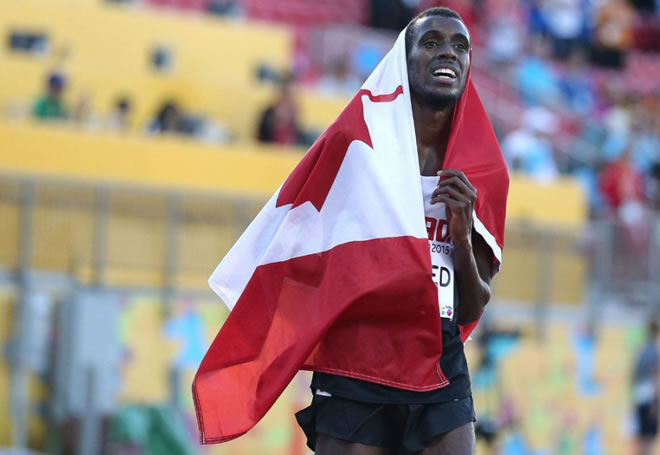
By KERRY GILLESPIE Sports reporter
Friday August 4, 2017

LONDON—When athletes talk about overcoming hurdles to succeed in sport, they’re often talking about recovering from injuries or finding the money to train and compete.
But for Canada’s Mohammed Ahmed, the hurdles start well before he even gets to the track for an international meet. Getting through airport screening can be more trying than his 5,000- and 10,000-metre races, especially if it’s in the United States, where he lives and trains.
In a post-9/11 world, his Muslim name has always posed challenges at border crossings; he has been harassed, scrutinized and, when he was still in high school, yanked out of a car at the Peace Bridge to Buffalo, N.Y., and treated like an enemy combatant.
“There’s always going to be a little bit of hurdles that you have to go through, and crossing the border and stuff like that is something that I’ve always dealt with, even from a young age, really young.”
Ahmed, now 26, was born in Mogadishu, Somalia, and spent his first 10 years growing up in Kenya before his family moved to Canada and settled in St. Catharines, Ont.
He’ll be judged by his abilities in London, where he’ll race in the 10,000 on Friday and the 5,000 next week. Off the track, that’s not always the case.
“I’ve always had to deal with people thinking I’m some sort of terrorist,” he says. “You just have to have a little bit of humour, you just got to laugh it off, deal with it and get on with it.”
But U.S. President Donald Trump has made that harder to do. His executive order that restricts travel for some people from six Muslim majority countries, including Somalia, has made Ahmed’s heritage even more problematic at and, at times, proven to be one hurdle too many.
In May, he wasn’t able to clear airport screening in Portland, Ore., where he lives, in time to make his flight to Doha to compete in a Diamond League event. As a result, the Canadian record-holder in the 5,000 metres doesn’t expect to qualify for the Diamond League final later this month.
“It is what it is,” he shrugged at the Canadian championships. “Some financial losses but it’s OK. Hopefully things go well at worlds.”
But even a man who writes poetry as self-therapy can only take so much unfairness. “Sometimes it’s tough,” he admits. “I try my best to not be angry about it.”
A lesson he learned first from his mother, Hamilo Farah, and later honed through running has helped. “I don’t want to boast but — I think I take this from my mom — I’m very patient and I think if there’s one thing running has taught me is to be patient, so I try to be as patient as I can.”
He is patient at airport check-in counters while he works to clear his name to get his boarding pass, and he is patient when he’s pulled aside for additional screening at security. He channels his energy on what matters most to him and that’s winning on the track.
But even thinking about doing that here means finding a way to beat one of the world’s greatest distance runners, Britain’s Mo Farah, a man he shares Somali heritage with, on his home turf.
“Mo’s good, Mo’s really good. He’s been tactically unbeatable over the last eight years. He’s at home and I know what it’s like to run against him at home. The crowd is just deafening, you can’t hear anything, but I try to dream big,” says Ahmed, who was a young runner in the 10,000 at the 2012 London Olympics.
Farah has won every 5,000 and 10,000 outdoor title he has contested over the last six seasons, including double gold at the last two Olympics and world championships. And, much like sprinter Usain Bolt, Farah is looking to extend his winning streak to his final world championship races.
Ahmed has reason to believe a medal could be within his grasp here as well.
Hhe was in the mix for one in the 5,000 at the Rio Games last summer, right up until the final 100 metres or so when he couldn’t match the final kick of the leaders and ultimately finished fourth.
“Ever since I stepped off the track in Rio, I’ve been thinking about London,” Ahmed says.
Rio wasn’t the result he wanted — no athlete dreams of a fourth-place finish and he can barely bring himself to even watch a video of the race — but his ability to stay with the leaders so close to the finish line was an eye-opening experience.
“Rubbing elbows with guys like Mo Farah and the best of East Africa, it’s an experience that you don’t forget,” he says. “It forces you to think big.”